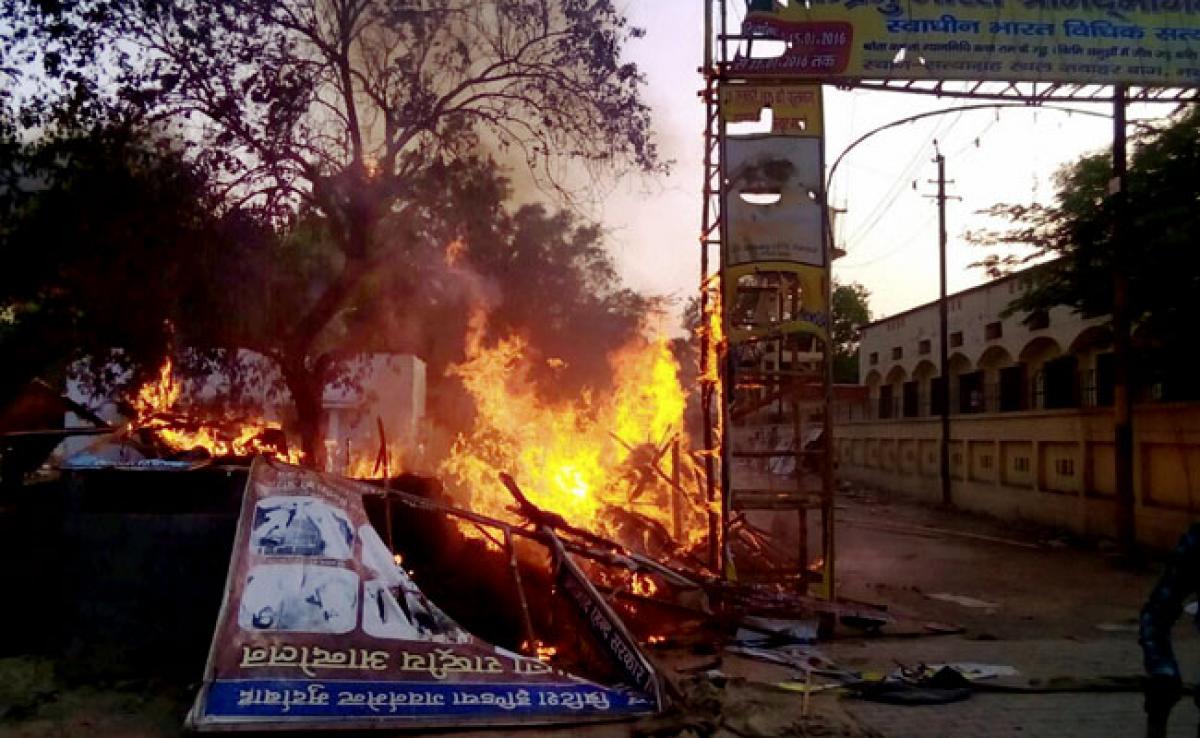Live
- GMR Airports Unveils AI-Powered Digital Twin Platform to Transform Airport Operations
- India poised to become leading maritime player: PM Modi
- Top Causes of Kidney Stones and How to Recognize Silent Symptoms
- India’s renewable energy capacity logs 14.2 pc growth at 213.7 GW
- Winter Session of Odisha Assembly adjourned sine die
- Biden calls Trump's tariff approach 'major mistake'
- After Drama Over Eknath Shinde’s Chief Minister Race, Maharashtra Cabinet Formation Faces New Tensions
- Egyptian FM, Blinken discuss recent developments in Syria
- Iran's supreme leader says Syria's developments result of US-Israeli 'plot'
- Elon Musk to Purchase $100 Million Luxury Mansion Next to Donald Trump's Mar-a-Lago, Report Reveals
Just In

The radical group of squatters behind the deadly violence in Mathura on Thursday claims loyalty to Netaji Subhas Chandra Bose and wants to alter the political and economic landscape of India.
The radical group of squatters behind the deadly violence in Mathura on Thursday claims loyalty to Netaji Subhas Chandra Bose and wants to alter the political and economic landscape of India.
But deep down, its ambition primarily was to grab government-owned prime real estate in this Hindu holy city and create an empire of their own in the growing market-mix of politics and sprituality.
The ragtag army of the little known Swadheen Bharat Subhas Sena, allegedly led by Ram Vriksha Singh Yadav, a disciple of Mathura-based Tulsidas Maharaj also known as "Jai Gurudev", had been occupying Mathura's sprawling 300-acre Jawaharbagh since January 2014.
The group, which calls itself "satyagrahis" or revolutionaries, began staying in the park on the pretext of staging demonstrations.
The protests had started as part of a rally from Madhya Pradesh that was supposed to terminate at Delhi. The rallyists were denied permission to move on to the capital but were allowed to hold the demonstration at the park -- which once had thousands of mango, gooseberry, and berry trees -- but only for two days.
The rallyists, however, stayed on and encroached the park for two years, during which they felled the trees to facilitate the shanty town of thousands of protesters from eastern Uttar Pradesh, Bihar, Jharkhand and Madhya Pradesh.
According to police, there were 3,000 of them living inside the park where their leader Ram Vriksha Singh Yadav, who is now untraceable, ran a "parallel government", amassing a huge cache of arms and ammunition.
Police claimed to have recovered some 47 country-made pistols, six rifles and 178 live cartridges from the park after the bloodshed on Thursday saw 24 persons, including a superintendent of police and 22 encroachers, killed.
A police officer told IANS on condition of anonymity that the squatters had also managed illegal electricity and water connections and had built toilets by destroying pavements. They would pick fights with any outsider trying to enter the park.
All this was happening right under the nose of the authorities. The district magistrate's office and the police line complex are at a stone's throw from the park.
Ram Vriksha Singh Yadav, the cult leader on the run, is a known disciple of "Jai Gurudev" who was said to have left behind a Rs 12,000-crore empire after his death. This sparked a leadership tussle between three claimants -- Ram Vriksha Singh Yadav, Pankaj Yadav and Umakant Tiwari.
The empire included land worth Rs 4,000 crore, a school, a petrol pump in Mathura - all in the name of the "Jai Gurudev Trust". His fleet of luxury cars included Plymouths, Mercedes Benz, Skodas and BMWs.
Pankaj Yadav won the battle, and Ram Vriksha Singh Yadav fell apart with him and led his own faction of Gurudev followers to create another empire on the grabbed government land.
In the last two years, he became so powerful that even the administration could not touch him and get the park vacated. He even allegedly held hostage a government officer who had gone to inquire about the group inside the cluster of slums and semi-permanent structures.
The group had been raising demands like no prime minister elections and establishment of an "Azad Hind government", a kind of dictatorial set.
They also demanded the rule book of Subhas Chandra Bose's Indian National Army to be treated as the law of the land and used for governance in the country. They wanted the currency notes used by Azad Hind Fauj, or the Indian National Army which fought the British Empire with the Japanese help, to be printed again with Bose's name and brought back into circulation.
They wanted petrol and diesel to be priced at one rupee a litre, and above all the park to be handed over to them permanently.
None of that happened.
But curtains came down violently on the 30-month old "revolution" after police stormed the park on Thursday and were showered with bullets by squatters. Some 250 of them have been arrested, and the rest have run away.

© 2024 Hyderabad Media House Limited/The Hans India. All rights reserved. Powered by hocalwire.com







